Support of Elasticsearch for .NET
CAST supports Eleasticsearch via its com.castsoftware.nosqldotnet extension. Details about how this support is provided for .NET source code is discussed below.
Supported Client Libraries
| Library | Version | Supported |
|---|---|---|
| Elasticsearch.NET | 7.x | |
| NEST | 7.x |
Supported Operations
| Operation | Scenario | Methods Supported |
|---|---|---|
| Insert | Elasticsearch.Net | Elasticsearch.Net.ElasticLowLevelClient.Index Elasticsearch.Net.ElasticLowLevelClient.IndexAsync Elasticsearch.Net.ElasticLowLevelClient.Bulk Elasticsearch.Net.ElasticLowLevelClient.BulkAsync Elasticsearch.Net.ElasticLowLevelClient.Index Elasticsearch.Net.ElasticLowLevelClient.IndexAsync Elasticsearch.Net.ElasticLowLevelClient.IndexUsingType Elasticsearch.Net.ElasticLowLevelClient.IndexUsingTypeAsync |
| Insert | NEST | Nest.ElasticClient.Index Nest.ElasticClient.IndexAsync Nest.ElasticClient.IndexDocument Nest.ElasticClient.IndexDocumentAsync Nest.ElasticClient.Bulk Nest.ElasticClient.BulkAsync Nest.ElasticClient.Index Nest.ElasticClient.IndexAsync Nest.ElasticClient.IndexDocument Nest.ElasticClient.IndexDocumentAsync Nest.ElasticClient.Create Nest.ElasticClient.CreateAsync Nest.ElasticClient.CreateUsingType Nest.ElasticClient.CreateUsingTypeAsync |
| Update | Elasticsearch.Net | Elasticsearch.Net.ElasticLowLevelClient.Update Elasticsearch.Net.ElasticLowLevelClient.UpdateAsync Elasticsearch.Net.ElasticLowLevelClient.UpdateByQuery Elasticsearch.Net.ElasticLowLevelClient.UpdateByQueryAsync Elasticsearch.Net.ElasticLowLevelClient.Update Elasticsearch.Net.ElasticLowLevelClient.UpdateAsync Elasticsearch.Net.ElasticLowLevelClient.UpdateByQuery Elasticsearch.Net.ElasticLowLevelClient.UpdateByQueryAsync |
| Update | NEST | Nest.ElasticClient.Update Nest.ElasticClient.UpdateAsync Nest.ElasticClient.UpdateByQuery Nest.ElasticClient.UpdateByQueryAsync Nest.ElasticClient.Update Nest.ElasticClient.UpdateAsync Nest.ElasticClient.UpdateByQuery Nest.ElasticClient.UpdateByQueryAsync |
| Select | Elasticsearch.Net | Elasticsearch.Net.ElasticLowLevelClient.Search Elasticsearch.Net.ElasticLowLevelClient.SearchAsync Elasticsearch.Net.ElasticLowLevelClient.DocumentExists Elasticsearch.Net.ElasticLowLevelClient.DocumentExistsAsync Elasticsearch.Net.ElasticLowLevelClient.Explain Elasticsearch.Net.ElasticLowLevelClient.ExplainAsync Elasticsearch.Net.ElasticLowLevelClient.Count Elasticsearch.Net.ElasticLowLevelClient.CountAsync Elasticsearch.Net.ElasticLowLevelClient.CountUsingType Elasticsearch.Net.ElasticLowLevelClient.CountUsingTypeAsync Elasticsearch.Net.ElasticLowLevelClient.DocumentExists Elasticsearch.Net.ElasticLowLevelClient.DocumentExistsAsync Elasticsearch.Net.ElasticLowLevelClient.Explain Elasticsearch.Net.ElasticLowLevelClient.ExplainAsync Elasticsearch.Net.ElasticLowLevelClient.Get Elasticsearch.Net.ElasticLowLevelClient.GetAsync Elasticsearch.Net.ElasticLowLevelClient.MultiGet Elasticsearch.Net.ElasticLowLevelClient.MultiGetAsync Elasticsearch.Net.ElasticLowLevelClient.MultiGetUsingType Elasticsearch.Net.ElasticLowLevelClient.MultiGetUsingTypeAsync Elasticsearch.Net.ElasticLowLevelClient.MultiTermVectors Elasticsearch.Net.ElasticLowLevelClient.MultiTermVectorsAsync Elasticsearch.Net.ElasticLowLevelClient.MultiTermVectorsUsingType Elasticsearch.Net.ElasticLowLevelClient.MultiTermVectorsUsingTypeAsync Elasticsearch.Net.ElasticLowLevelClient.Search Elasticsearch.Net.ElasticLowLevelClient.SearchAsync Elasticsearch.Net.ElasticLowLevelClient.SearchMvt Elasticsearch.Net.ElasticLowLevelClient.SearchMvtAsync Elasticsearch.Net.ElasticLowLevelClient.Source Elasticsearch.Net.ElasticLowLevelClient.SourceAsync Elasticsearch.Net.ElasticLowLevelClient.SourceExists Elasticsearch.Net.ElasticLowLevelClient.SourceExistsAsync Elasticsearch.Net.ElasticLowLevelClient.SourceExistsUsingType Elasticsearch.Net.ElasticLowLevelClient.SourceExistsUsingTypeAsync Elasticsearch.Net.ElasticLowLevelClient.SourceUsingType Elasticsearch.Net.ElasticLowLevelClient.SourceUsingTypeAsync Elasticsearch.Net.ElasticLowLevelClient.TermVectors Elasticsearch.Net.ElasticLowLevelClient.TermVectorsAsync Elasticsearch.Net.ElasticLowLevelClient.TermVectorsUsingType Elasticsearch.Net.ElasticLowLevelClient.TermVectorsUsingTypeAsync |
| Select | NEST | Nest.ElasticClient.Search Nest.ElasticClient.SearchAsync Nest.ElasticClient.DocumentExists Nest.ElasticClient.DocumentExistsAsync Nest.ElasticClient.Explain Nest.ElasticClient.ExplainAsync Nest.ElasticClient.Get Nest.ElasticClient.GetAsync Nest.ElasticClient.Count Nest.ElasticClient.CountAsync Nest.ElasticClient.DocumentExists Nest.ElasticClient.DocumentExistsAsync Nest.ElasticClient.Explain Nest.ElasticClient.ExplainAsync Nest.ElasticClient.Get Nest.ElasticClient.GetAsync Nest.ElasticClient.MultiGet Nest.ElasticClient.MultiGetAsync Nest.ElasticClient.MultiSearch Nest.ElasticClient.MultiSearchAsync Nest.ElasticClient.MultiSearchTemplate Nest.ElasticClient.MultiSearchTemplateAsync Nest.ElasticClient.MultiTermVectors Nest.ElasticClient.MultiTermVectorsAsync Nest.ElasticClient.Source Nest.ElasticClient.SourceAsync Nest.ElasticClient.SourceExists Nest.ElasticClient.SourceExistsAsync Nest.ElasticClient.TermVectors Nest.ElasticClient.TermVectorsAsync |
| Delete | Elasticsearch.Net | Elasticsearch.Net.ElasticLowLevelClient.Delete Elasticsearch.Net.ElasticLowLevelClient.DeleteAsync Elasticsearch.Net.ElasticLowLevelClient.DeleteByQuery Elasticsearch.Net.ElasticLowLevelClient.DeleteByQueryAsync Elasticsearch.Net.ElasticLowLevelClient.Delete Elasticsearch.Net.ElasticLowLevelClient.DeleteAsync Elasticsearch.Net.ElasticLowLevelClient.DeleteByQuery Elasticsearch.Net.ElasticLowLevelClient.DeleteByQueryAsync Elasticsearch.Net.ElasticLowLevelClient.DeleteByQueryRethrottle Elasticsearch.Net.ElasticLowLevelClient.DeleteByQueryRethrottleAsync Elasticsearch.Net.ElasticLowLevelClient.DeleteByQueryUsingType Elasticsearch.Net.ElasticLowLevelClient.DeleteByQueryUsingTypeAsync |
| Delete | NEST | Nest.ElasticClient.Delete Nest.ElasticClient.DeleteAsync Nest.ElasticClient.DeleteByQuery Nest.ElasticClient.DeleteByQueryAsync Nest.ElasticClient.Delete Nest.ElasticClient.DeleteAsync Nest.ElasticClient.DeleteByQuery Nest.ElasticClient.DeleteByQueryAsync |
Objects
| Icon | Description |
|---|---|
|
DotNet Elasticsearch Cluster |
|
DotNet Elasticsearch Index |
|
DotNet Unknown Elasticsearch Index |
Links
| Link type | Source and destination of link | Methods supported |
|---|---|---|
| belongsTo | From DotNet Elasticsearch Index object to DotNet Elasticsearch Cluster object |
- |
| useLink | Between the caller .NET Class / Method objects and DotNet Elasticsearch Index objects | Bulk BulkAsync DefaultIndex |
| useInsertLink | Between the caller .NET Class / Method objects and DotNet Elasticsearch Index objects | Index IndexAsync IndexDocument IndexDocumentAsync Create CreateAsync CreateUsingType CreateUsingTypeAsync IndexUsingType IndexUsingTypeAsync IndexDocument Map MapAsync IndexDocumentAsync |
| useDeleteLink | Between the caller .NET Class / Method objects and DotNet Elasticsearch Index objects | Delete DeleteAsync DeleteByQuery DeleteByQueryAsync DeleteByQueryRethrottle DeleteByQueryRethrottleAsync DeleteByQueryUsingType DeleteByQueryUsingTypeAsync |
useSelectLink |
Between the caller .NET Class / Method objects and DotNet Elasticsearch Index objects | Search SearchAsync DocumentExists DocumentExistsAsync Explain ExplainAsync Get GetAsync Count CountAsync CountUsingType CountUsingTypeAsync DocumentExists DocumentExistsAsync Explain ExplainAsync Get GetAsync IndexExists IndexExistsAsync MultiGet MultiGetAsync MultiGetUsingType MultiGetUsingTypeAsync MultiTermVectors MultiTermVectorsAsync MultiTermVectorsUsingType MultiTermVectorsUsingTypeAsync Search SearchAsync SearchMvt SearchMvtAsync Source SourceAsync SourceExists SourceExistsAsync SourceUsingType SourceUsingTypeAsync TermVectors TermVectorsAsync TermVectorsUsingType TermVectorsUsingTypeAsync |
| useUpdateLink | Between the caller .NET Class / Method objects and DotNet Elasticsearch Index objects | Update UpdateAsync UpdateByQuery UpdateByQueryAsync UpdateByQueryRethrottle UpdateByQueryRethrottleAsync |
What results can you expect?
Some example scenarios are shown below:
Cluster Creation and Default Index(Elasticsearch.Net and NEST)
class HighLevel
{
public void UsingConnectionPool()
{ var uris = new[]
{
new Uri("http://localhost:9200"),
new Uri("http://localhost:9201"),
new Uri("http://localhost:9202"),
};
var connectionPool = new SniffingConnectionPool(uris);
var settings = new ConnectionSettings(connectionPool)
.DefaultIndex("people");
var client = new ElasticClient(settings);
}
}
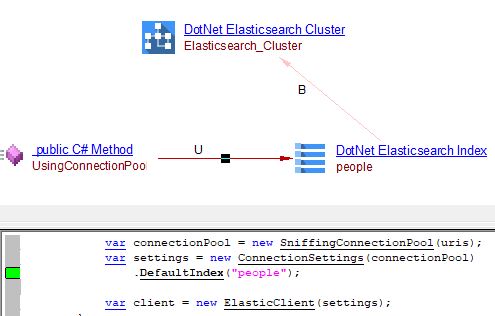
Cluster Creation From Configuration File
<?xml version="1.0" encoding="utf-8"?>
<configuration>
<configSections>
<section name="resizer" type="ImageResizer.ResizerSection,ImageResizer" requirePermission="false" />
<section name="quartz" type="System.Configuration.NameValueSectionHandler, System, Version=1.0.5000.0,Culture=neutral, PublicKeyToken=b77a5c561934e089" />
<section name="rockConfig" type="Rock.Configuration.RockConfig, Rock" />
<section name="entityFramework" type="System.Data.Entity.Internal.ConfigFile.EntityFrameworkSection, EntityFramework, Version=6.0.0.0, Culture=neutral, PublicKeyToken=b77a5c561934e089" requirePermission="false" />
</configSections>
<appSettings>
<add key="baseUrl" value="http://127.0.0.1:9200" />
<add key="AllowDuplicateGroupMembers" value="false" />
<add key="EnableRedisCacheCluster" value="False" />
<add key="RedisPassword" value="" />
<add key="RedisEndpointList" value="" />
<add key="RedisDatabaseNumber" value="0" />
<add key="CacheManagerEnableStatistics" value="False" />
</appSettings>
<runtime>
<assemblyBinding xmlns="urn:schemas-microsoft-com:asm.v1">
<dependentAssembly>
<assemblyIdentity name="System.Web.Http" publicKeyToken="31bf3856ad364e35" culture="neutral" />
<bindingRedirect oldVersion="0.0.0.0-5.2.3.0" newVersion="5.2.3.0" />
</dependentAssembly>
<dependentAssembly>
<assemblyIdentity name="System.Net.Http.Formatting" publicKeyToken="31bf3856ad364e35" culture="neutral" />
<bindingRedirect oldVersion="0.0.0.0-5.2.3.0" newVersion="5.2.3.0" />
</dependentAssembly>
<dependentAssembly>
<assemblyIdentity name="Microsoft.IdentityModel.Tokens" publicKeyToken="31bf3856ad364e35" culture="neutral" />
<bindingRedirect oldVersion="0.0.0.0-5.2.1.0" newVersion="5.2.1.0" />
</dependentAssembly>
<dependentAssembly>
<assemblyIdentity name="Microsoft.Owin" publicKeyToken="31bf3856ad364e35" culture="neutral" />
<bindingRedirect oldVersion="0.0.0.0-4.0.0.0" newVersion="4.0.0.0" />
</dependentAssembly>
<dependentAssembly>
<assemblyIdentity name="Microsoft.Owin.Security" publicKeyToken="31bf3856ad364e35" culture="neutral" />
<bindingRedirect oldVersion="0.0.0.0-4.0.0.0" newVersion="4.0.0.0" />
</dependentAssembly>
<dependentAssembly>
<assemblyIdentity name="Microsoft.IdentityModel.Protocol.Extensions" publicKeyToken="31bf3856ad364e35" culture="neutral" />
<bindingRedirect oldVersion="0.0.0.0-1.0.40306.1554" newVersion="1.0.40306.1554" />
</dependentAssembly>
<dependentAssembly>
<assemblyIdentity name="Microsoft.AspNetCore.DataProtection.Abstractions" publicKeyToken="adb9793829ddae60" culture="neutral" />
<bindingRedirect oldVersion="0.0.0.0-2.0.0.0" newVersion="2.0.0.0" />
</dependentAssembly>
</assemblyBinding>
</runtime>
<system.codedom>
<compilers>
<compiler extension=".cs" language="c#;cs;csharp" warningLevel="4" compilerOptions="/langversion:7.3 /nowarn:1659;1699;1701" type="Microsoft.CodeDom.Providers.DotNetCompilerPlatform.CSharpCodeProvider, Microsoft.CodeDom.Providers.DotNetCompilerPlatform, Version=3.6.0.0, Culture=neutral, PublicKeyToken=31bf3856ad364e35">
<providerOption name="UseAspNetSettings" value="false" />
</compiler>
</compilers>
</system.codedom>
</configuration>
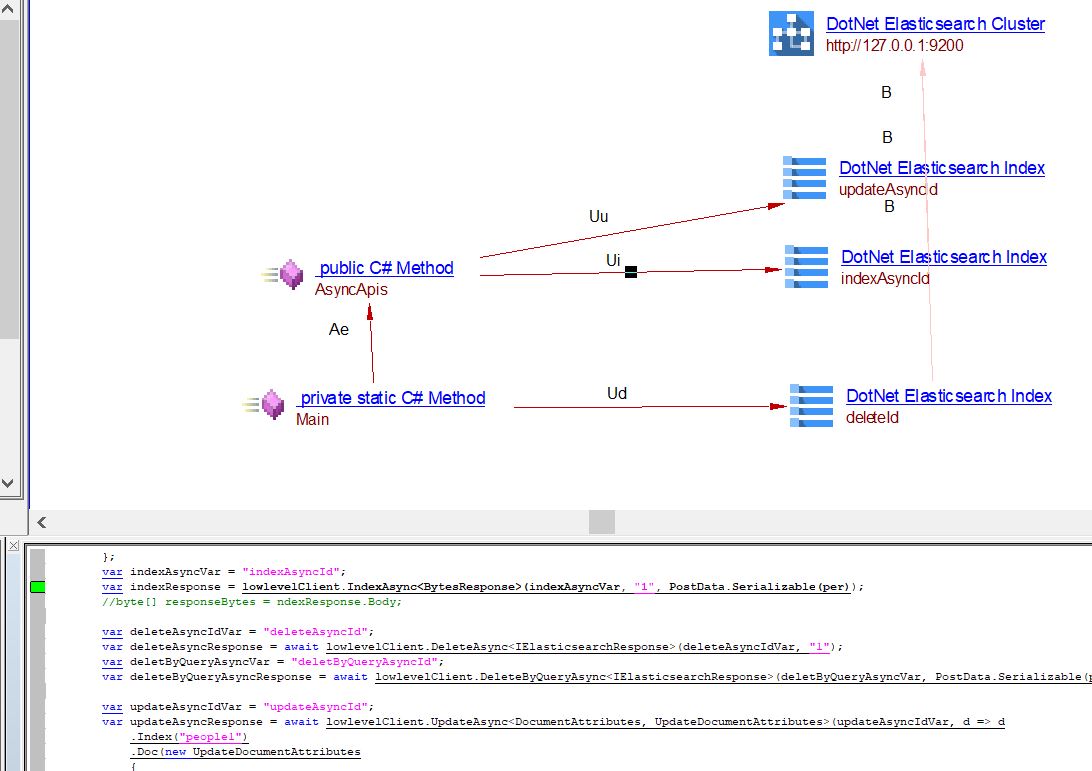
Insert Operation(Elasticsearch.Net and NEST)
IndexDocument
public void Indexing()
{
var person = new Person
{
Id = 1,
FirstName = "Martijn",
LastName = "Laarman"
};
var ndexResponse = client.IndexDocument(person); //<1>
}
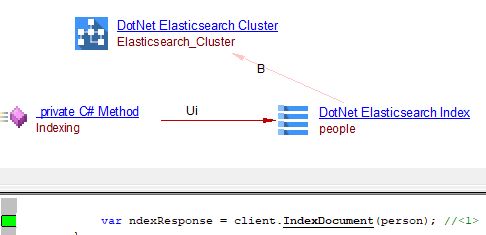
IndexDocumentAsync
public async Task IndexingAsync()
{ var person = new Person
{
Id = 2,
FirstName = "Jack",
LastName = "Mas"
};
var asyncIndexResponse = await client.IndexDocumentAsync(person);
}
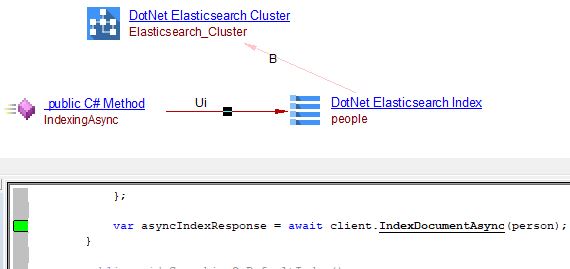
Update Operation(Elasticsearch.Net and NEST)
public static bool updateDocument(string searchID, string first_name, string last_name)
{
bool status;
//Update by Partial Document
var response = client.Update<DocumentAttributes, UpdateDocumentAttributes>(searchID, d => d
.Index(index)
.Doc(new UpdateDocumentAttributes
{
FirstName = first_name,
LastName = last_name
}));
}
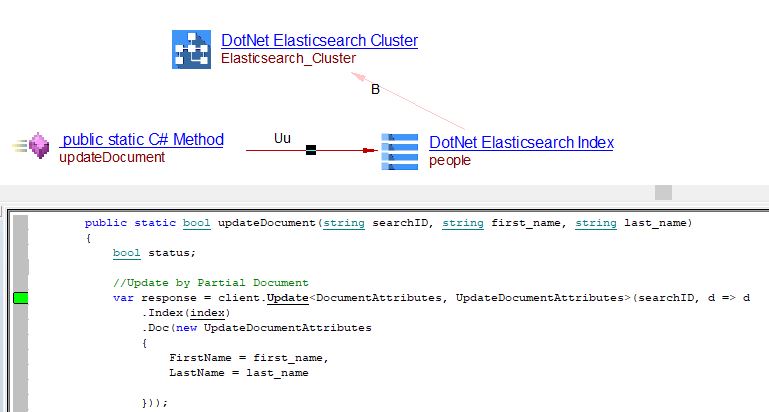
Select Operation(Elasticsearch.Net and NEST)
public void SearchingOnDefaultIndex()
{
var searchResponse = client.Search<Person>(s => s
.From(0)
.Size(10)
.Query(q => q
.Match(m => m
.Field(f => f.FirstName)
.Query("Martijn")
)
)
);
var people = searchResponse.Documents;
}
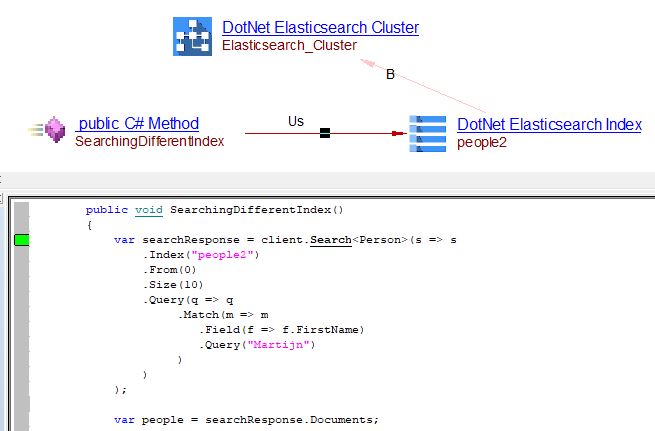
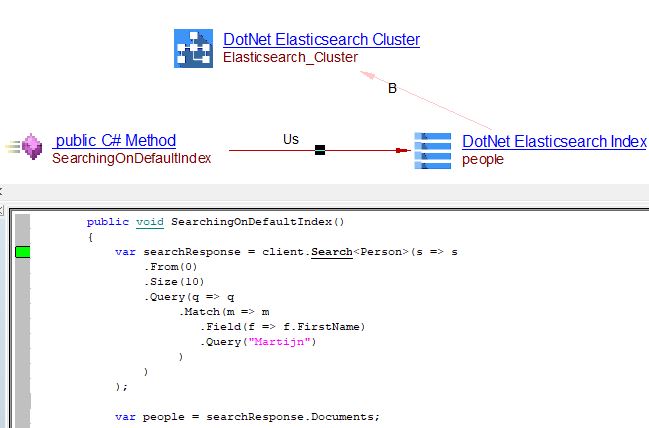
Delete Operation(Elasticsearch.Net and NEST)
public static bool deleteDocument(string index, string searchID)
{
bool status;
var response = client.Delete<DocumentAttributes>(searchID, d => d
.Index(index));
if (response.IsValid)
{
status = true;
}
else
{
status = false;
}
return status;
}
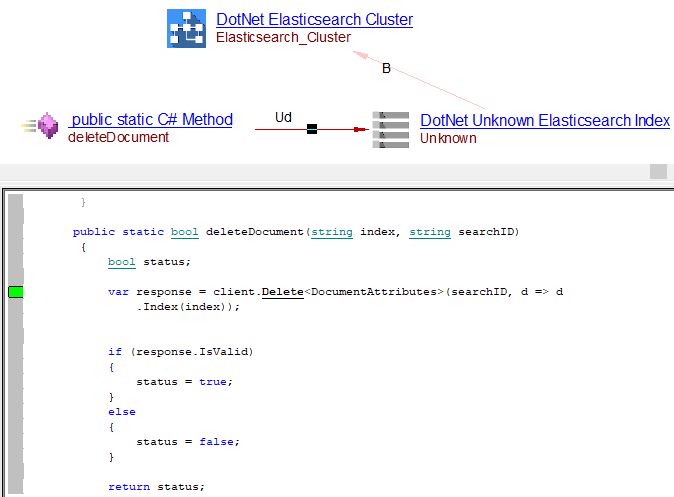
Bulk Operations(Elasticsearch.Net and NEST)
public void BulkOperations()
{
var people = new object[]
{
new { index = new { _index = "people", _type = "person", _id = "1" }},
new { FirstName = "Martijn", LastName = "Laarman" },
new { index = new { _index = "people", _type = "person", _id = "2" }},
new { FirstName = "Greg", LastName = "Marzouka" },
new { index = new { _index = "people", _type = "person", _id = "3" }},
new { FirstName = "Russ", LastName = "Cam" },
};
var ndexResponse = lowlevelClient.Bulk<StringResponse>(PostData.MultiJson(people));
string responseStream = ndexResponse.Body;
}
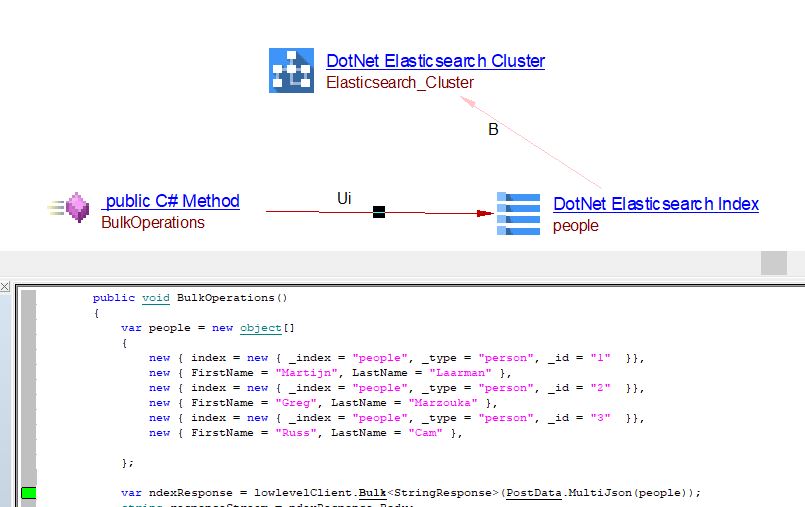
Bulk Operations Using Fluent DSL
public void BulkOperationsUsingFluentDSL ()
{
var result = client.Bulk(b => b
.Index<Person>(i => i
.Document(new Person {Id = 2})
)
.Create<Person>(c => c
.Document(new Person { Id = 3 })
)
.Delete<Person>(d => d
.Document(new Person { Id = 4 })
));
}
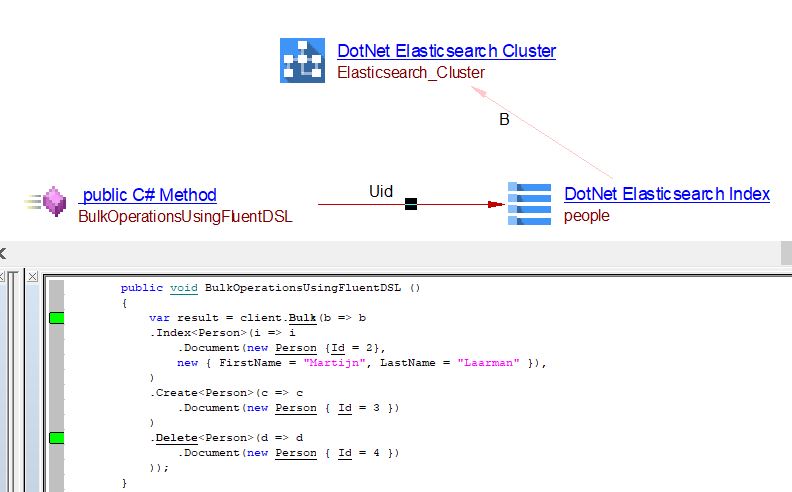
Known Limitations
- If index names are not resolved, the links are created between methods and default or unknown index objects